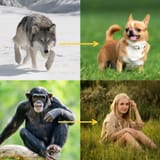>>16783176
>Can you do the same for a few substitutions?
Well yes, of course, easily. Say we had the following DNA sequence:
ATG GCT GGT TCT AAA CTG GTT ACT CCT GAT GAA TAT CAT AAT TGT TTT CAA CGT ATT TGG
This would produce the following amino acids:
Methionine, Alanine, Glycine, Serine, Lysine, Leucine, Valine, Threonine, Proline, Aspartic acid, Glutamic acid, Tyrosine, Histidine, Asparagine, Cysteine, Phenylalanine, Glutamine, Arginine, Isoleucine, Tryptophan
Let's have two substitutions:
The fifth codon, AAA has a substitution to AGA, and the eleventh codon GAA becomes GAC.
We now have:
Methionine, Alanine, Glycine, Serine, Arginine, Leucine, Valine, Threonine, Proline, Aspartic acid, Aspartic acid, Tyrosine, Histidine, Asparagine, Cysteine, Phenylalanine, Glutamine, Arginine, Isoleucine, Tryptophan
So two amino acids out of 20. 90% with two substitutions.
Now, can you do the same with a frameshift to this example sequence?
>Do you struggle with the word “if”?
What I'm struggling with is understanding your exact point and what specifically you're saying is incorrect. It seems like you're denying something that you yourself said earlier. You said "If it’s the result of only a couple substitutions then it wouldn’t", as if to challenge that it is the result of a couple of substitutions, but earlier you yourself quoted "two amino acid replacements in the EII′ protein (i.e. Gly to Asp (EII-type) at position 181 (G181D) and His to Asn (EII-type) at position 266 (H266N)) are sufficient to increase the Ald-hydrolytic activity back to the level of the parental EII enzyme".
>You are describing lab environments devoid of outside nutrition
Well of course, isn't that where the experiments I cited took place?
>these are waste water ponds we’re talking
The wastewater pond of a factory polluted with industrial runoff doesn't strike you as an environment that will often be stressful? Especially for bacteria, who are always competing with millions for food?








































